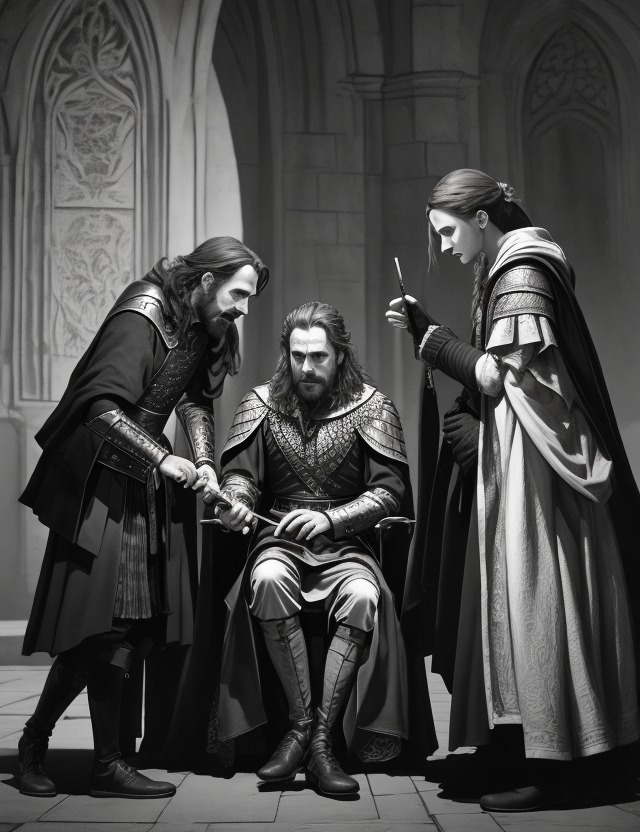Unveiling the Treacherous Journey of Ambition and Power: Step into the Dark Realm of Shakespeare’s Timeless Masterpiece – Macbeth. Delve into the riveting narrative that narrates the enthralling rise and electrifying downfall of the infamous Scottish lord. As we explore the historical context, delve into the brilliant mind of Shakespeare, and highlight the sheer brilliance of Macbeth’s tragic tale, we invite you on an unforgettable journey where ambition knows no bounds and consequences abound.
Brace yourself as we unravel the secrets, analyze the characters, and decode the layers of this compelling tragedy. Embark on this enlightening expedition and witness firsthand why Macbeth continues to captivate audiences centuries later. But be warned, dear reader, for the allure of power can be irresistible, yet the repercussions can be catastrophic…
Tales from Shakespeare Macbeth Summary
Once upon a time, in a faraway kingdom called Scotland, there lived a brave and noble warrior named Macbeth. This incredible story begins with Macbeth returning victorious from a fierce battle where he fought for his king and country. His valor on the battlefield caught the attention of three mysterious witches who had been watching his every move. These witches, known as the Weird Sisters, were mischievous yet powerful creatures who could see into the future.
As Macbeth journeyed home with his trusted friend Banquo, the witches appeared before them. They greeted Macbeth with a perplexing prophecy, hailing him as the future king of Scotland. Shocked and bewildered, Macbeth and Banquo didn’t know what to make of the witches’ words. However, ambition had started to take root in Macbeth’s heart, and the thought of becoming king consumed his every thought.
Driven by the prophecy, Macbeth couldn’t resist sharing the news with his devoted wife, Lady Macbeth. Eager to seize this opportunity, Lady Macbeth persuaded her husband to take matters into their own hands and make the prophecy come true. The idea of committing a terrible deed to secure the crown sent shivers down Macbeth’s spine, but his overwhelming desire for power clouded his judgment.
A banquet was held at the castle to honor the king, Duncan, who was unaware of the dark thoughts brewing in Macbeth’s mind. With Lady Macbeth’s encouragement, Macbeth saw his chance when Duncan decided to stay as a guest at their castle for the night. Consumed by his ambition, Macbeth murdered Duncan in his sleep, a horrific act that would haunt him forever.
As the sun rose, Macbeth, with his hands stained in blood, was proclaimed the new king of Scotland. However, his conscience tormented him, and a sense of paranoia began to settle in. Banquo, Macbeth’s loyal friend, grew suspicious of his actions and questioned the integrity of the newly crowned king. Fearing the prophecy that Banquo’s descendants would rule over Scotland, Macbeth ordered his murderers to kill Banquo and his son, Fleance.
As the days turned into nights, Macbeth’s reign became shrouded in darkness and treachery. Haunted by guilt, Macbeth’s descent into madness accelerated. He became fearful, seeing ghosts and hearing voices that only he could perceive. The once noble and valiant warrior had become a twisted and tormented ruler.
Lady Macbeth’s guilt also consumed her, and she began sleepwalking, tormented by the remorse of the unholy acts committed. The famous line, “Out, damned spot! Out, I say!” rang through the halls of the castle as Lady Macbeth tried to wash away the bloodstains she saw on her hands, both real and imaginary.
In the midst of the chaos, Macbeth resorted to consulting the witches once again, desperate for reassurance and answers. The Weird Sisters provided him with a series of prophecies, further fueling his overconfidence and leading him deeper down a path of destruction.
Macbeth’s reign took a disastrous turn when a united force of Scottish nobles, led by Duncan’s son, Malcolm, and the brave Macduff, rebelled against the tyrant king. Seeking his downfall, Macbeth’s enemies began closing in, while his mental state further deteriorated.
The tragic and climactic battle between Macbeth’s forces and the opposing army led by Malcolm and Macduff eventually took place. Macduff, fueled by revenge, confronted Macbeth face to face. Realizing that the witches had deceived him, Macbeth valiantly fought but succumbed to Macduff’s superior skill. In that moment, Macbeth’s life, once filled with ambition and desire, came to a tragic end.
With Macbeth’s defeat, Scotland was restored to a state of peace and harmony under the leadership of Malcolm. The rightful heir to the throne, Malcolm promised to rule with fairness and justice. The kingdom mourned the loss of those who fell victim to Macbeth’s ambition but rejoiced in the hope of a better future.
“Macbeth” is a timeless play by the great playwright William Shakespeare that teaches us the dangers of unchecked ambition and the consequences of allowing our desires to blind us. It serves as a cautionary tale, reminding us to stay true to our moral compass and resist the temptations that may lead us astray.
As you embark on your own adventures, dear young readers, remember to always listen to your heart and make choices that align with your values. Let the story of Macbeth serve as a reminder to be wary of the temptations that may come our way and to never let our ambition overpower our sense of right and wrong.
Macbeth Theme
Macbeth, written by William Shakespeare, is a tragedy that follows the rise and fall of a Scottish nobleman who becomes consumed by his ambition for power. The play explores several key themes that shape the narrative and provide insight into human nature and the consequences of wrongdoing.
1. Ambition and Power:
One of the most prominent themes in Macbeth is the destructive nature of unchecked ambition and the lust for power. Macbeth’s ambition drives him to commit heinous acts, including regicide and manipulating others to achieve his desired position as the king. The play portrays ambition as a catalyst for corruption, as Macbeth’s insatiable desire for power leads him down a dark path, ultimately leading to his downfall. Shakespeare demonstrates the damaging effects of uncontrolled ambition, as Macbeth’s actions result in a loss of morality, guilt, and the destruction of his relationships.
2. Guilt and Conscience:
Another important theme in Macbeth is the exploration of guilt and the unrelenting presence of a troubled conscience. Macbeth experiences immense guilt and remorse after committing the murder of King Duncan, struggling to escape the haunting consequences of his actions. The play delves into the psychological toll of guilt, as Macbeth is tormented by his actions and is haunted by hallucinations and visions. The theme emphasizes the idea that one can’t escape their conscience, and even the most calculating of individuals will be driven to madness by guilt.
3. Fate and Free Will:
The theme of fate versus free will is also central to Macbeth. Throughout the play, Macbeth encounters supernatural elements, including the witches, their prophecies, and apparitions. These supernatural occurrences lead Macbeth to believe that his actions are predetermined, causing him to question whether he has control over his own destiny. However, the play also examines the role of free will and personal choices, as Macbeth makes conscious decisions that shape his path. While fate appears to play a role in Macbeth’s tragic downfall, the play suggests that individuals have the power to alter their fate through their choices and actions.
In conclusion, Macbeth explores the themes of ambition and power, guilt and conscience, and fate versus free will. Through the tragic journey of Macbeth, Shakespeare delves into the dark side of human nature and demonstrates the destructive consequences of ambition and the pursuit of power. The play serves as a cautionary tale, reminding audiences of the importance of morality, ethical choices, and the repercussions of succumbing to one’s darkest desires.
List of Characters Macbeth
– Macbeth: The tragic protagonist of the story, Macbeth starts off as a loyal and brave Scottish general. However, after encountering three witches who prophesy his rise to power, he becomes consumed by ambition and is driven to commit heinous acts to secure his throne. His physical appearance is described as being of noble stature, with a rugged yet charismatic presence. Ironically, he suffers from a “dagger delusion” that leads him to see a floating dagger before committing regicide.
– Lady Macbeth: Macbeth’s ambitious and manipulative wife, Lady Macbeth plays a significant role in urging her husband to seize the throne. She is described as strikingly beautiful, with sharp features that mirror her cunning nature. Known for her extraordinary skill in persuasion, she famously invokes spirits to “unsex her” and fill her with ruthlessness. Despite her initial strength, her guilt and madness eventually become overwhelming, leading to her tragic downfall.
– Banquo: Macbeth’s loyal companion and fellow general, Banquo is portrayed as honorable and noble. He is described as tall with a muscular build and a calming presence. Banquo encounters the same witches as Macbeth and receives a prophecy that his descendants will become kings, which greatly disturbs Macbeth. Though tempted by the prophecy, Banquo remains virtuous, creating a stark contrast to Macbeth’s descent into darkness.
– The Three Witches: These mysterious, supernatural beings ignite the tragedy of Macbeth by presenting prophecies to the protagonist. The trio is described as sinister and otherworldly, with pale, gaunt faces and devious grins. They have the mischievous ability to vanish and reappear at will. Often seen stirring cauldrons and chanting, their rhyming and eerie predictions add an air of foreboding throughout the story.
– Macduff: A loyal Scottish nobleman, Macduff quickly becomes suspicious of Macbeth’s rise to power and grows sympathetic to those affected by his ruthless acts. Physically, he is depicted as a brawny warrior with a fiery red beard, symbolizing his passionate nature. Macduff plays a pivotal role in ultimately overthrowing Macbeth, fueled by his desire for justice and revenge.
– Duncan: The King of Scotland at the beginning of the story, Duncan is portrayed as a benevolent and wise ruler. Despite his kind demeanor, his naivety and trust in others contribute to his downfall. Duncan is described as a regal figure with a silver mane, exuding an air of maturity and authority. His murder at the hands of Macbeth sets the tragic events of the play into motion.
– Fleance: Banquo’s young son, Fleance serves as a symbol of hope and potential, as it is prophesied that he will eventually become king. Although not extensively described, Fleance is portrayed as a courageous and intelligent boy who ultimately escapes Macbeth’s attempts to eliminate him. His survival hints at the possibility of a brighter future beyond the dark reign of Macbeth.
– Hecate: The goddess of witchcraft and the leader of the witches’ coven, Hecate is shrouded in mystery and power. Her physical appearance is defined by her flowing black robes and her piercing, cat-like eyes. Hecate influences the actions of the witches in the play, particularly by encouraging them to deceive and manipulate Macbeth, ultimately leading to his downfall.
Macbeth: Symbols
1) Dagger: The dagger is a powerful symbol in Macbeth, representing the destructive and corruptive nature of ambition. In Act 2, Macbeth sees a hallucination of a dagger floating in the air before him. This dagger symbolizes the idea of temptation and the internal struggle between good and evil within Macbeth’s mind. As he contemplates whether to commit the heinous act of regicide, the dagger serves as a physical manifestation of his desire for power and the dark path he is about to embark on.
2) Blood: Blood is a pervasive and potent symbol in Macbeth, representing guilt, violence, and the consequences of one’s actions. Shakespeare explores the motif of blood throughout the play, emphasizing the brutal nature of Macbeth’s rise to power. The blood also symbolizes the heavy burden of guilt on Macbeth and Lady Macbeth’s conscience after they commit regicide, and they become obsessed with trying to wash away their guilt. The constant presence of blood reinforces the theme that ambition and the pursuit of power lead to destruction and chaos.
3) Sleep: Sleep is symbolized as a sanctuary in Macbeth and often represents innocence, peace, and order. Macbeth’s guilt and paranoia prevent him from finding restful sleep, and he becomes plagued by nightmares and the fear of being caught for his crimes. Lady Macbeth sleepwalks in Act 5, confessing to their evil deeds while she is asleep, showcasing the psychological consequences of their actions. The theme of sleeplessness and disturbed sleep symbolizes the disruption of the natural order caused by Macbeth’s ambition and the loss of innocence and tranquility.
Setting in Macbeth
The setting of Macbeth is in Scotland during the 11th century. Scotland was a separate country at that time, but its proximity to England led to many struggles over who would rule the area. The play is set in the northernmost region of what is now the United Kingdom, which is often dark, dreary, and damp . The physical setting of the play reflects the secrecy and deception of the title character. The most important action, such as the murder of Duncan, takes place indoors, at night, suggesting the setting is not terribly important to the action. However, the references to nature itself being out of order suggest that even the physical surroundings have been thrown into disorder by Macbeth’s treachery.
Best Quotes for Macbeth
Macbeth: Culture Impact
Shakespeare’s timeless tragedy “Macbeth” is not just a book; it is a cultural phenomenon that has left an indelible mark on history. Since its first performance in 1606, this captivating play has had a profound impact on the world of literature, theater, and popular culture.
Historically, “Macbeth” holds great significance as it was written during the reign of King James I of England and Scotland. It is believed that Shakespeare tailored certain aspects of the play to please the new monarch, who had a keen interest in witchcraft and the supernatural. This cultural context adds an intriguing layer to the story, showcasing the powerful influence of political and cultural factors on artistic creation.
Funny as it may seem, “Macbeth” has given rise to numerous superstitions within the world of theater. Actors and theater practitioners often refer to the play as “The Scottish Play” instead of its actual name, as they believe uttering the original title inside a theater brings about bad luck. Legend has it that this superstition arose due to the frequent mishaps, injuries, and even deaths that occurred during early productions of “Macbeth,” leading to a collective fear of invoking misfortune by mentioning the play’s title.
Moreover, “Macbeth” has achieved immense acclaim and recognition for its poetic language, rich characters, and the exploration of universal themes like ambition, guilt, and the corrupting nature of power. The play’s iconic soliloquies, such as Lady Macbeth’s “Out, damned spot!” and Macbeth’s “Is this a dagger I see before me?” have become renowned quotes embedded in the cultural fabric.
The influence of “Macbeth” extends well beyond the realm of literature and theater. Countless adaptations, both on screen and stage, have been created over the centuries, with each interpretation adding a unique twist to the classic tale. From Orson Welles’ haunting film adaptation to recent productions set in modern-day corporate boardrooms, “Macbeth” continues to captivate and inspire audiences across generations.
Furthermore, the characters and motifs from “Macbeth” have seeped into popular culture, permeating music, film, art, and even political discourse. Artists and musicians have drawn upon the dark and mysterious atmosphere of the play, while its themes of ambition and power have resonated with political leaders and influencers throughout history.
In summary, “Macbeth” holds a prominent place in our cultural heritage. Its impact reverberates through time, leaving a trail of historic significance, amusing superstitions, and remarkable achievements. The play’s lasting legacy continues to ignite the human imagination, inspiring countless adaptations and serving as a timeless reminder of the consequences of unchecked ambition and the fragile nature of the human psyche.
FAQs
1. Who is the author of the book “Macbeth”?
William Shakespeare is the author of the play “Macbeth.” He is widely regarded as one of the greatest playwrights in history.
2. What is the main plot of “Macbeth”?
“Macbeth” tells the story of a Scottish general, named Macbeth, who receives a prophecy from three witches that he will become the King of Scotland. Consumed by his ambition, Macbeth becomes increasingly ruthless, leading to a series of tragic consequences.
3. What are some key themes explored in “Macbeth”?
“Macbeth” addresses various themes such as ambition, fate and free will, power and corruption, guilt, and the consequences of unchecked ambition. These themes are intricately woven into the play’s narrative and character development.
4. What are the famous quotes from “Macbeth”?
There are several well-known quotes from “Macbeth,” such as “Double, double toil and trouble” (spoken by the witches), “Is this a dagger which I see before me?” (spoken by Macbeth), and “Out, out, brief candle!” (spoken by Lady Macbeth). These quotes are often referenced and have become part of popular culture.
5. What is the significance of the three witches in “Macbeth”?
The three witches, also known as the Weird Sisters, play a crucial role in the play. They serve as supernatural beings who provide prophecies and manipulate Macbeth’s actions. Their presence adds an element of fate and the supernatural, heightening the tension and tragedy within the story.
6. Are the Witches in Macbeth real?
The Witches in Macbeth are not real, but they are based on the historical and cultural beliefs of witchcraft and the supernatural in Shakespeare’s time. The Witches represent the forces of evil and chaos that tempt and manipulate Macbeth to commit his crimes. They also reflect the fears and anxieties of the Elizabethan society, which was plagued by political and religious conflicts, as well as outbreaks of disease and famine. The Witches also serve as a dramatic device to create suspense and foreshadow the events of the play.
7. Did Macbeth always want to be king?
Macbeth did not always want to be king, but he was ambitious and curious about his fate. When he met the Witches, who prophesied that he would become the Thane of Cawdor and the King of Scotland, he was intrigued and excited by their words. However, he was also hesitant and doubtful about their reliability and morality. He was influenced by his wife, Lady Macbeth, who persuaded him to kill King Duncan and seize the throne. He was also driven by his own guilt and paranoia, which made him commit more murders and atrocities to secure his power.
8. Why does Macbeth think the Witches want to help him?
Macbeth thinks the Witches want to help him because they tell him what he wants to hear and what seems to be true. The Witches’ first prophecy, that he would become the Thane of Cawdor and the King of Scotland, was partially fulfilled when he was named the Thane of Cawdor by King Duncan. This made Macbeth believe that the Witches were reliable and benevolent, and that their second prophecy, that he would become the king, would also come true. He also trusted the Witches’ second set of prophecies, that he would not be harmed by anyone born of woman, and that he would not be defeated until Birnam Wood moved to Dunsinane Hill. These prophecies seemed to be impossible and reassuring, and Macbeth did not realize that they were actually deceptive and misleading.
9. Does Lady Macbeth commit suicide?
Lady Macbeth does commit suicide, although the exact details and reasons are not explicitly stated in the play. In Act 5, Scene 5, Macbeth receives the news that Lady Macbeth is dead, and he expresses his indifference and despair. He says, “She should have died hereafter; / There would have been a time for such a word” (5.5.16–17). In Act 5, Scene 8, Malcolm, the rightful heir to the throne, reports that he has heard from a credible source that Lady Macbeth took her own life. He says, “Producing forth the cruel ministers / Of this dead butcher and his fiend-like queen, / Who, as ’tis thought, by self and violent hands / Took off her life” (5.8.69–72). The most likely explanation for Lady Macbeth’s suicide is that she was consumed by guilt and madness, as she was unable to cope with the consequences of her and her husband’s crimes.
10. How did Birnam Wood move and why was Macduff able to kill Macbeth?
Birnam Wood moved and Macduff was able to kill Macbeth because of the Witches’ trickery and Macbeth’s arrogance. The Witches had told Macbeth that he would not be defeated until Birnam Wood moved to Dunsinane Hill, which Macbeth thought was impossible and absurd. However, when the English army, led by Malcolm and Macduff, approached Macbeth’s castle, they used branches from Birnam Wood to disguise themselves and their numbers. This made it seem like the forest was moving, and Macbeth realized that the Witches had fooled him. The Witches had also told Macbeth that he would not be harmed by anyone born of woman, which Macbeth thought was universal and certain. However, when he faced Macduff in the final battle, Macduff revealed that he was not born of woman, but was delivered by a cesarean section. This meant that Macduff was the exception to the rule, and Macbeth realized that the Witches had deceived him again. Macduff then killed Macbeth and ended his tyranny.










